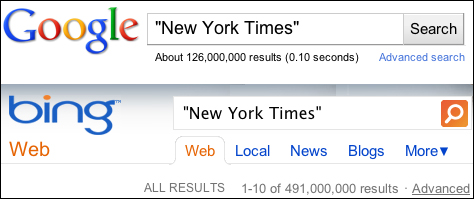Search for "New York Times" on Google, and you'll get 126,000,000 results (in about 0.14 seconds). Search the same query on Bing? Prepare for 491,000,000 results.
These astronomical figures appear below the search box on every query, yet not only are the numbers misleading, they're also pointless. On neither search engine do these figures match up with the results users can actually access. In the case of the "New York Times" query, you'll reach the end of the line on Bing by page 23, with only 223 results displayed; on Google, the site returns just 468 results in 47 pages. (These figures change slightly with each subsequent search.)

But every query somehow boasts of millions if not billions of results returned. Why do Bing and Google insist on keeping the result counter at the top of every page? For all but the companies' engineers, these figures are as arbitrary as they are meaningless. But to Bing-ers and Googlers alike, these figures may represent something more: a pissing contest between two of the world's largest search giants to show how large their search indexes are.
"It's totally unhelpful, I agree, and I'm not sure why we still have it there," says Stefan Weitz, director at Bing, of the results ticker. "It's this legacy thing, I think, that [Google and Bing] have had for years, to show off how big our index is."
The numbers provide little substance for users. After all, how many users ever click beyond the first hundred results or the first thousand? On both search engines, in fact, it appears impossible to even get beyond 1,000 results. Google will display at most 100 pages with 10 results per page; a lot of the time, users will receive the following message halfway through, (as I did on my "New York Times" search): "In order to show you the most relevant results, we have omitted some entries very similar to the 468 already displayed." Some entries have been omitted? Try 125,999,532.
Of course, the result counters aren't hurting anyone, but in the age of a trillion URLs, we rely on these search engines to deliver us the most relevant results--and not simply boast of the billions of results their engines could return if only we had the time to click and scroll and click through all of them. No one should have to comprehend the sublime notion of an index that size for every query--it's a bit like having to count every blade of grass in Central Park during a search for New York's most famous green space. (Google boasts of 28,400,000 results for that query, by the way.)
The truth is, a results counter could be helpful, if only it was accurate. But according to Weitz, the algorithm in control of the ticker "guesstimates the number, which is usually totally wrong." This, then, is a case of: we've done it this way for so long, we will keep on doing it. "I think Google has had it for so long that people expect to see it up there," Weitz says.
Just to illustrate how inflated the result counters have become, try searching for a query on Google and Bing that returns less than 1,000 results. Start typing in long strings of words, as I did. A search for: Lobster Prism Infinity Zebra Banana Salem Pilgrim Elephant Frisbee Four Loko Stapler Quarter? Still 3,820 results on Google. A subsequent search for the same eclectic set of terms? Now 2,760 results, for whatever reason.
Finally, after adding more and more words with quotes in certain areas, I was able to reduce the index ticker below 1,000. It only took a search for: Lobster "Prism" Infinity "Zebra" Banana "Salem" "Pilgrim" Elephant "Frisbee" Four Loko "Stapler" Quarter Keys Fork Wallet "Crab" "Clock" "Socks" "Flocks."
For that search on Google and Bing, there were 835 and 759 results, respectively. But only 173 and 269 results displayed. And on subsequent searches for these same terms, at different times, the result tallies changed seemingly at random on both search engines--Bing's even dropped down to around 50 hits at one point.
Finally, a manageable figure. But isn't that still way too many results for a query that included "Four Loko" and "Stapler" and "Zebra"?
No comments:
Post a Comment